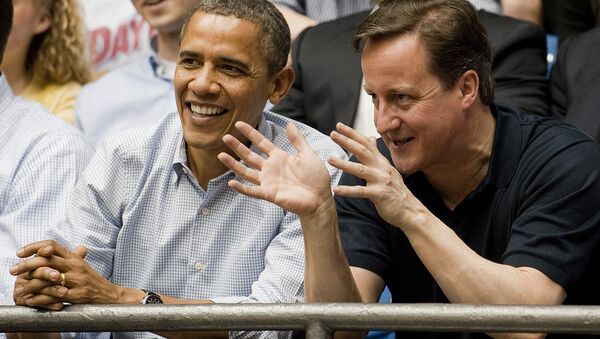The meeting's agenda is to include issues of international trade, global economic outlook and counter-terrorism. But, certainly in the UK, a lot of the talk in the run-up to the meeting has been primarily about domestic politics.
In addition to always referencing the ‘special relationship' between the UK and US, top British politicians these days tend to go out of their way to show just how special their personal relationship with POTUS is. Last July leader of the opposition Ed Miliband made a trip to the US and secured what was termed a ‘brush-by' meeting with Obama in order to raise his profile as a PM in-waiting — mostly for the domestic audience, of course.
David Cameron's two-day trip this week has been preceded by intense speculation to the effect that some in President Obama's entourage would prefer a Labour victory in May and have allegedly tried to subvert the PM's visit (something the Labour Party has denied); hence the triumphant talk about a 'public relations coup' and a much rosier outlook for a Conservative victory.
In a recent interview David Cameron revealed that Barack Obama "sometimes calls me ‘bro'." (Beat that, Miliband!) In very recent history, one can also recall G.W. Bush's close relationship with Tony ‘Yo' Blair. We don't know if Bush used any specific terms which could illustrate the intimacy of their relationship but it seems in Blighty itself Tony Blair was most often referred to as Washington's 'poodle' and 'lap-dog'.
Internet Security Top of Agenda
David Cameron's working dinner in the White House and the official talks in the Oval Office the next day are supposed to cover international trade, the global economic outlook and counter-terrorism. In particular, internet security is rumoured to be the topic that will dominate the two leaders' conversation.
The recent scandal with the hacking of Sony Pictures has of course been followed by a particularly embarrassing hijacking of the US Central Command's YouTube and Twitter accounts this week. But the problem is an enduring one: Britain's surveillance agency GCHQ has revealed that more than 80 per cent of UK firms experienced an internet security breach in 2014.
Now Obama and Cameron are going to discuss greater cooperation between GCHQ and its US counterpart, the National Security Agency. In most people's minds that would probably raise the question of how much closer that cooperation can be: as it is, GCHQ shares pretty much shares all data it collects on British citizens with Americans. That means everything from emails and phone calls to internet usage and credit card purchases.
We have yet to see if 'international trade' which is on the agenda will cover Transatlantic Trade and Investment Partnership (TTIP) or how robust David Cameron will be in articulating obvious concerns that exist in Britain about this giant trade agreement between the US and EU. Also, we have yet to see if the meeting in the Oval Office will be a discussion between partners and not one party taking notes of what the other is saying.
Of course international cooperation is a reasonable way to counter the various threats that transcend national boundaries in this age of globalised economy and communications. But it is not particularly comfortable to see how a nation's sovereignty is signed over along with the privacy of its citizens.
Most Trusted Ally
There can hardly be an argument that the relationship between the UK and US is special, as it has been that way for a long time. Though lately, much effort has been expended by London to assure the British public that it is still number one in Washington's phone book — to counter claims that when Obama has to 'speak to Europe' he dials Angela Merkel.
Of course there is a lot that ties the US and UK — history, language, trade, military and every other kind of cooperation. But there is still something more than faintly insulting about the fact that contenders for the leadership of a proud sovereign nation should seek what amounts to a blessing from an overseas suzerain.
Interestingly, a 2014 BBC poll revealed that a fairly modest 52 per cent in the UK see the role of the US as positive, but a surprising 42 per cent see it as negative. The share of people seeing the US as a negative influence is quite astounding if one considers that we are talking about a nation's closest and most trusted partner and ally.
It seems that these days the UK's claim to a special relationship with Washington hinges on London being the best proxy for projecting US policies and interests and the most eager satellite in virtually anything Washington contemplates or undertakes in Europe and beyond. In that sense it is indeed closer to Washington than any other capital.
It is quite amusing that a country which at least wants to appear assertive about protecting its sovereignty from the EU bureaucracy in Brussels doesn't find it a problem to dance to any tune that comes out of Washington.




